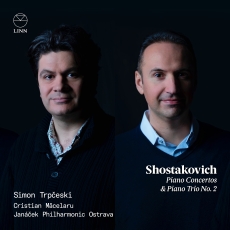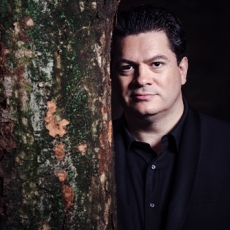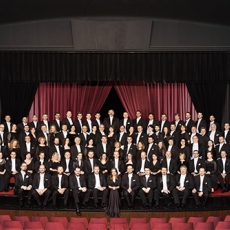Simon Trpčeski, Cristian Măcelaru & Janáček Philharmonic Ostrava - Shostakovich: Piano Concertos & Piano Trio No. 2 - Pizzicato
Diese Neuaufnahme der beiden Klavierkonzerte von Dmitri Shostakovich beeindruckt einerseits durch das freie, wendige Spiel des Pianisten Simon Trpceski und andererseits durch das offene und leichte Orchesterspiel der Janacek-Philharmonie aus Ostrava unter der inspirierten Leitung von Cristian Macelaru. Überhaupt ist es Macelaru, dem es auf überzeugende Weise gelingt, Shostakovichs Musik durch ein quasi schichtweise überlagertes Klanggeschehen neu zu definieren und der Musik so alles Schwere zu nehmen. Das hat den Vorteil, dass das Orchester sehr flexibel reagieren kann und sich sehr gut auf den Pianisten einstellen kann. Trpceski liegt es fern, einen klassisch-schweren Shostakovich mit üblichem Pathos zu spielen. Vielmehr ist es eine Interpretation, die das kammermusikalische Element, einen gewissen Improvisationscharakter und das Miteinander in den Vordergrund stellt. Somit erlebt der Hörer zwei ungemein dynamische Aufnahmen der Klavierkonzerte, das Erste mit einem sehr guten Andrei Kavalinski auf der Trompete. Die Janacek Philharmonie Ostrava spielt recht gut, wird aber von der Klangtechnik räumlich wie auch, was die Klarheit anbetrifft, etwas vernachlässigt.
Ein absoluter Hörgenuss ist auch das Klaviertrio, das Simon Trcpeski zusammen mit Aleksandar Krapovski, Violine und Alexander Somov, Cello spielt. Auch hier stehen Dynamik, Innenspannung, Kommunikation und ein leichtes, wendiges Klangbild im Vordergrund.
This new recording of the two piano concertos by Dmitri Shostakovich impresses on the one hand with the free, agile playing of pianist Simon Trpceski and on the other hand with the open and light orchestral playing of the Janacek Philharmonic Orchestra from Ostrava under the inspired direction of Cristian Macelaru. In general, it is Macelaru who convincingly succeeds in redefining Shostakovich’s music through a multilayered sound which removes all heaviness from the music. This has the advantage that the orchestra can react very flexibly and adapt very well to the pianist. Trpceski is far from playing a classically heavy Shostakovich with the usual pathos. Rather, it is an interpretation that emphasizes the chamber music element, a certain improvisational character, and togetherness. Thus the listener experiences two immensely dynamic recordings of the piano concertos, the first with a very fine Andrei Kavalinski on trumpet. The Janacek Philharmonic Orchestra of Ostrava plays quite well, but is somewhat neglected by the sound crew in terms of spatiality as well as in terms of clarity.
The Piano Trio played by Simon Trcpeski together with Aleksandar Krapovski, violin, and Alexander Somov, cello, is also an absolute listening pleasure. Here, too, the emphasis is on dynamics, inner tension, communication and a light, agile sound.



